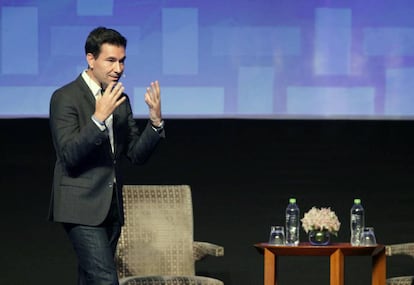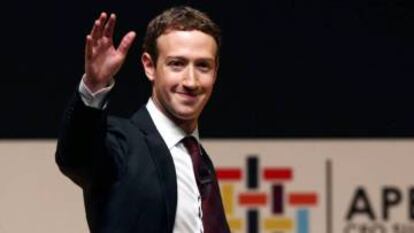Facebook vice-president: “Brazil and Mexico are two of our main countries”
Regional company head Diego Dzodan unveils social media giant’s plans for greater global connectivity
Facebook, the platform with 1.8 billion users worldwide, is changing communications everywhere, but particularly in Latin America. This is one of the regions of the world that took longest to achieve internet connectivity, and which still has large pockets in rural and poor areas that are cut off from the online world. But Latin America has embraced the digital era enthusiastically, to the point that it has become a key region for Facebook. Around 215 million people go online monthly from six countries in the region: Argentina, Brazil, Colombia, Mexico, Peru and Chile.

Diego Dzodan, Facebook’s vice-president for Latin America, participated at the 2016 APEC Economic Leaders’ Week, where Facebook founder Mark Zuckerberg was a leading speaker.
Dzodan said that the company is particularly interested in the potential of Brazil and Mexico.
“We have two Latin American nations in the top five of people who access the platform monthly: Brazil is number three and Mexico is number five in the world,” he noted. “In Brazil, that is 108 million people accessing the platform every month. Historically it’s been a very important region for Facebook, it’s very strategic. Latin Americans use Facebook a lot to get informed and connect with friends.”
We are undertaking the mission of making the world more open and connected with great energy and responsibility Diego Dzodan, Facebook vice-president for Latin America
The company has regional offices in Sao Paulo, Buenos Aires, Mexico City and Bogotá.
Speaking at the summit in Lima, Zuckerberg asked leaders to invest in greater connectivity, rather than close up to investment. Facebook has conducted pilot projects to bring the internet to remote areas in Latin America.
“In Peru, for instance, there are 30 million people. And 17 million of them access Facebook monthly. We are interested in getting internet access to those other 13 million,” he said, going on to discuss Aquila, a drone that offers internet access in remote areas. Its wings, said Zuckerberg, are the size of a Boeing 757 yet it weighs less than a car and runs on solar energy, which enables it to remain in the air for months.
“Imagine what could be achieved with that drone in the Amazon area,” he mused.

Meanwhile, Dzodan – who is himself from Argentina – offered clues to the way in which Facebook is influencing the daily lives of Latin Americans, to the point of displacing the traditional media.
“The key to it all lies in cellphones,” he explained. “With cellphones we have such an ability to process data and access information right in our hand, and this has increased the time we spend on the platform. Many studies tell us that we look at our phone 100 times a day. Surveys tell us that people spend one out of every five cellphone minutes checking out Facebook or Instagram; because they spend so much time with their cellphones, they stop consuming other traditional media.”
Dzodan would rather let Zuckerberg himself reply to the criticism over Facebook’s growing role and power. But he will admit that the company is aware of the enormity of having 108 million pairs of Brazilian eyes turn to Facebook for their view of the world.
“We are undertaking the mission of making the world more open and connected with great energy and responsibility,” said Dzodan. “That is our mission. And that trend is very strong in Latin America.”
English version by Susana Urra.
Tu suscripción se está usando en otro dispositivo
¿Quieres añadir otro usuario a tu suscripción?
Si continúas leyendo en este dispositivo, no se podrá leer en el otro.
FlechaTu suscripción se está usando en otro dispositivo y solo puedes acceder a EL PAÍS desde un dispositivo a la vez.
Si quieres compartir tu cuenta, cambia tu suscripción a la modalidad Premium, así podrás añadir otro usuario. Cada uno accederá con su propia cuenta de email, lo que os permitirá personalizar vuestra experiencia en EL PAÍS.
¿Tienes una suscripción de empresa? Accede aquí para contratar más cuentas.
En el caso de no saber quién está usando tu cuenta, te recomendamos cambiar tu contraseña aquí.
Si decides continuar compartiendo tu cuenta, este mensaje se mostrará en tu dispositivo y en el de la otra persona que está usando tu cuenta de forma indefinida, afectando a tu experiencia de lectura. Puedes consultar aquí los términos y condiciones de la suscripción digital.








































